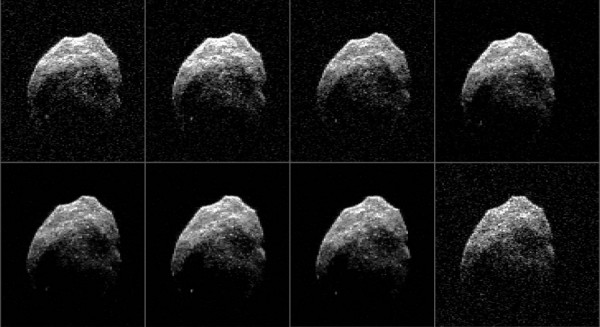By Ana Verayo, | December 15, 2016

Asteroid 2015 TB145 safely flew past Earth on Oct. 31, at 10:00 a.m. PDT (1 p.m. EDT) at about 1.3 lunar distances (300,000 miles, 480,000 kilometers). (NASA/JPL-Caltech/GSSR/NRAO/AUI/NSF)
A NASA scientist has revealed that we are not ready if a surprise asteroid is to hit the Earth.
The Hollywood blockbuster movie Armageddon can be considered a potential reality check about what will happen if a massive asteroid is headed towards the planet. It could cause mass destruction and wipe out life as we know it, said Joseph Nuth of NASA's Goddard Space Flight Center.
Like Us on Facebook
During a meeting in San Francisco with nuclear scientists at the American Geophysical Union conference, Nuth revealed that the "biggest problem" is there is simply nothing we can do about a life- threatening asteroid at the moment. He noted that although these collisions have been rare in our planet's history, they are still not unprecedented.
Nuth said there were extinction level events that wiped out the dinosaurs within a 50 to 60 million year gap which means that humanity may be due to experience another killer asteroid.
In 1996, Earth experienced a close call. Nuth explains that a comet came hurtling into Jupiter. In 2014, a comet nearly grazed Mars which suggests that this comet was close to Earth when it was discovered 22 months before it passed Mars.
With this in mind, Nuth suggests that NASA should develop an "interceptor rocket" that would be mounted on NASA's Planetary Defense Office. Nuth adds that there should be ready to launch a rocket that would be deployed with a year's warning that can lessen the possibility of a surprise asteroid from aweak observational point such as behind the sun.
Earlier this year, NASA created the Planetary Defense Coordination Office to coordinate global efforts to monitor and track down near-Earth objects such as asteroids and comets which can suddenly zip through our neighborhood.
NASA estimates that about 90 percent of the near-Earth objects detected are larger than one kilometer across.
-
Use of Coronavirus Pandemic Drones Raises Privacy Concerns: Drones Spread Fear, Local Officials Say

-
Coronavirus Hampers The Delivery Of Lockheed Martin F-35 Stealth Fighters For 2020

-
Instagram Speeds Up Plans to Add Account Memorialization Feature Due to COVID-19 Deaths

-
NASA: Perseverance Plans to Bring 'Mars Rock' to Earth in 2031

-
600 Dead And 3,000 In The Hospital as Iranians Believed Drinking High-Concentrations of Alcohol Can Cure The Coronavirus

-
600 Dead And 3,000 In The Hospital as Iranians Believed Drinking High-Concentrations of Alcohol Can Cure The Coronavirus

-
COVID-19: Doctors, Nurses Use Virtual Reality to Learn New Skills in Treating Coronavirus Patients







